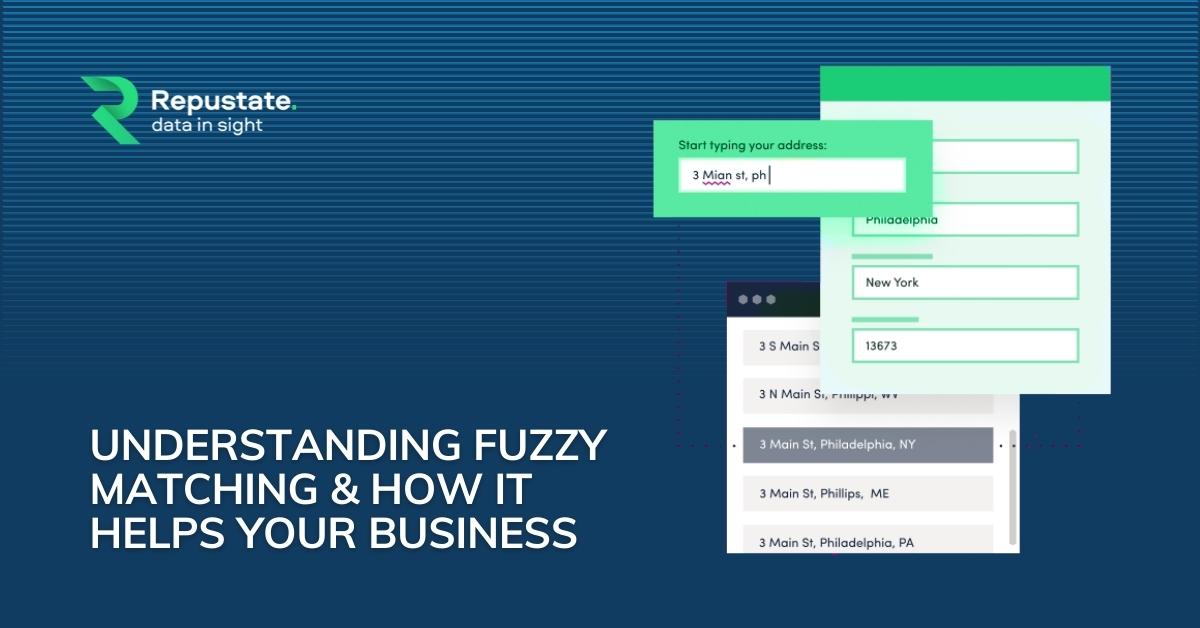Understanding Fuzzy Matching & How It Helps Your Business
Fuzzy matching is a machine learning technique that increases the accuracy of insights from data analysis. It addresses data complexity by removing redundancies in data and identifying false positives. In doing so, it helps seamlessly streamline and link customer data found across various records and data sources. Thus, it is a vital part of essential natural language processing tasks that are essential in data mining to derive sentiment from text.
What Is Fuzzy Matching?
Fuzzy matching is a machine learning (ML) methodology used in text analytics to identify two or more elements of data entries that are approximately the same, if not identical matches. It uses different sets of identifiers to compare results and decides whether two or more records are in fact referring to the same entity.
Fuzzy matching in natural language processing (NLP) tasks is vital because it enhances the accuracy of the data insights by overcoming complexities in data such as spelling variations, spelling mistakes, duplicate entries, abbreviations, etc. This makes it critical in a number of business applications such as sentiment analysis on reviews, healthcare database management, financial fraud detection, border security, etc.
Several fuzzy matching techniques are used in data analysis such as the Levenshtein Distance method, Jaro-Winkler Distance, Jaccard Index, Name Variant, and others.
How Is Fuzzy Matching Related To Semantic Search?
Fuzzy matching is an integral part of semantic search because it helps in finding the closest match to a text within a context, which is the basis of semantic analysis. Semantic search comprises many formats, all of which are based on contextualization of the keyword and the intent behind it. It goes beyond simple text matching and depends on more than a deterministic, binary-based method of information retrieval.
Fuzzy matching provides this capability. It helps in semantic search because it increases the threshold of the entity match and can do so across disparate data sources. This is crucial in business applications such as an organization’s internal data, customer data, sales records, customer profiling, healthcare records, and such.
Why Do Businesses Use Fuzzy Matching?
Businesses across industries need fuzzy matching for the following important functions:
- Merge customer records for a single customer view
- Remove redundant data and deduplication
- Data cleansing and preprocessing before analysis
- Standardize data for better accuracy of insights
- Fraud detection
- Enrich and consolidate data from multiple sources
- Create customer profiles for segmentation
- Match data for compliance and permissions
What Are The Benefits Of Fuzzy Matching Over Other Methods?
Fuzzy matching is better than deterministic matching and gives users more advantages due to its statistical analysis approach such as -
1. Helps simplify and consolidate complex data
Fuzzy matching helps manage data complexity by helping you identify matches by scanning records that have duplicate records with several variations in spellings, formatting, null entries, etc. such as in names, job titles, or email addresses. This makes it extremely useful in simplifying data complexity in healthcare, customer records for hotel bookings, insurance claims, etc.
2. Increase the matching threshold for manual data inspection
Fuzzy matching helps to increase or decrease the number of false positives when required for a business need. This helps data analysts to adjust the matching threshold and get more match results for manual data inspection when searching for any specific reason.
3. Find matches without unique identifier data
Fuzzy matching is critical in helping users to identify duplicate records in a database even if there is no constant unique identifier such as a keyword. Since fuzzy matching uses a statistical approach, it can be used for a variety of data sources that need not have specific constant data matches like date of birth, city of birth, etc.
4. Better matching accuracy
Unlike traditional methods like deterministic string matching which looks for exact matches like keywords in a binary manner, fuzzy matching can detect and isolate matches that lie in between the binaries of 0 and 1. This increases the matching threshold and thus improves the accuracy of the string match.
What Are The Limitations Of Fuzzy Matching And How Can You Overcome It?
Despite how useful fuzzy matching is, it does have some limitations such as the following -
1. Scalability
Fuzzy matching is great for hundreds of data entries and points, but when the size of the data increases, the algorithms cannot keep up. In an industry like healthcare or border security, millions of data points across scattered data exist. Fuzzy string matching cannot scale to this level.
2. Incorrect entity linking
There can be instances of incorrect entity linkings that can result in a higher level of positive matches in searches. This can lead to inefficient use of time spent by data analysts in manually identifying duplicates against constant identifiers.
3. Time-consuming data testing
The rules in fuzzy matching algorithms need to be checked constantly, refined, and then tested. This is necessary in order to ensure high-precision results in data analysis.
Overcoming The Limitations
Fuzzy matching limitations can be overcome by considering the below:
1. Better data quality
The best way to ensure great results and leverage fuzzy matching in the most effective manner is to ensure that you have good quality data. Clean, good quality data ensures that you get fewer false positives and negatives.
2. Enrich your metadata
When you enrich your metadata you get more coherent, contextual data. This increases your chances of getting higher accuracy in your results while manually checking the data and when the analysis is automated.
3. Profile your data
When you profile your data, you can standardize your data better. This allows you to establish the scope of your work such as data management, deduplication, streamlining, etc.
Semantic Search - An Introduction
Semantic search algorithms go beyond basic text string matching. They understand the intent behind a search, taking into consideration previous searches, the user profile, current activity, and so on. In this way, the algorithm makes sure that it doesn’t depend on a unique identifier such as a keyword or a date of birth but also takes into account anything else that is linked to the search term.
That’s why when searching for a flight or a restaurant on your mobile phone, you not only get the restaurant or the flight that you are looking for but also other details such as similar flight/restaurant options, information about the city in general, and other facilities that you may like. Thus, fuzzy matching makes semantic search more accurate, even though it is a small but important aspect of it.
Customer reviews analysis especially depends on deep-rooted semantic analysis and search for in-depth business insights. Solutions such as a Opentable API analytics use semantic clustering to provide accurate insights from customer reviews and comments. This also includes sentiment analysis steps that comprise tasks such as named entity recognition (NER), knowledge graphs, neural networks, and so on.
This capability is even more important when there is multilingual data because data in different languages can have different meanings. A multilingual sentiment analysis platform that can distinguish and understand different languages for the most high-precision semantic search results has individual speech taggers for each language it processes. Only this can lead to high accuracy that is independent of machine translations.
Watch this video to understand more.
Multilingual & Deep Semantic Search Capability | Repustate IQ Tutorials - YouTube
Conclusion
Data analytics whether for customer reviews analysis, social video content analysis, or any other business function needs to deliver high-accuracy results. Fuzzy matching, however complex, can help in this endeavor. It makes record linking seamless, identifies phonetic, miskeyed, or abbreviated names or text strings, and thus ensures higher matches for named entity classification and categorization.
Analysis of complex data provides a scientific basis of knowing how different classifiers behave in relation to certain intrinsic characteristics in the data. Deriving meaningful sentiment insights from this data is what can give you real business value from customer reviews and comments, whatever the source. It is this highly skilled AI-driven data analytics that gives you TikTok insights, YouTube comments analysis, and more.
 Home
Home
 Sep 14, 2022
Sep 14, 2022

 Jeremy Wemple
Jeremy Wemple
 Dr. Ayman Abdelazem
Dr. Ayman Abdelazem
 Dr. Salah Alnajem, PhD
Dr. Salah Alnajem, PhD
 David Allen
David Allen

 Repustate Team
Repustate Team

